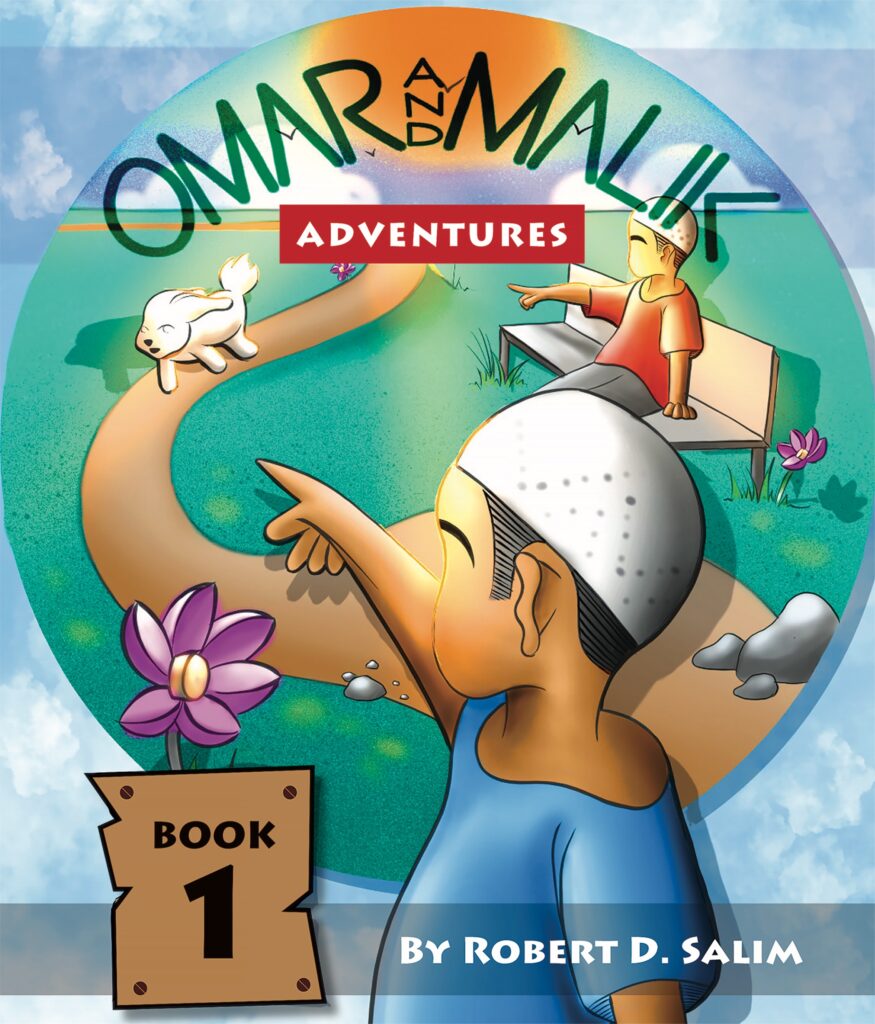“Move over Dick and Jane. Omar and Malik are on the block now.”

Islamic Horizons Staff
January/February 2022
Robert D. Salim, a resident of Northern Virginia, has seven children and fourteen grandchildren. A long-time revert to Islam, several years ago this now-retired professional firefighter and train conductor noticed a void in children’s literature — the lack of African American families — and decided to do something about it. His “Omar and Malik Adventures” series displays the lives of Muslim parents and elementary school children living their lives while interacting with a wide range of people and social situations.
Islamic Horizons talked to him about his efforts to fill this gap.
IH: What led you to start writing?
RDS: I’ve always been a writer. I began taking a more nuanced interest in it during high school when my English teacher encouraged me to take a creative writing college course. This summer class benefitted me tremendously in terms of creativity and learning about various writing techniques and styles.
IH: Who is your intended audience, and why?
RDS: My stories are directed toward beginning readers, primarily first through third graders. One thing that I learned during my school and college years is that reading is the core skill that propels people toward success in life’s endeavours. My books are directed toward everyone who loves reading: avid readers seeking to increase their knowledge, parents doing what they can to prepare their children for life and those who want to watch an African American Muslim family adhering to their faith while living a wholesome life that everyone can admire.
IH: Are these stories based upon your experiences?
RDS: The Omar and Malik stories mirror my developing nature of practising Islam’s tenets and injunctions, all of which are concerned with the people’s common interests: worship none but Allah, be good to your parents and relatives, as well as the orphan and poor, speak kindly to people, establish the prayer and give the prescribed charity.
My stories incorporate all of these virtues and more. I look at myself as a person who wants to contribute to building a better society. An African proverb states “It takes a village to raise a child,” and one can plainly see that Omar and Malik’s parents are raising them to be good and devout Muslims.
IH: Do you have any future projects in mind?
RDS: Yes! I have two projects in the works. Once is a seven-book series for preschoolers and kindergarteners, and the other is two novels for adults. Writing for adults seems harder than I thought, however, for it involves coming out of my comfort zone. Time will tell whenever they get released. Who knows, one of them might be the next great American novel [he says with a broad smile].
IH: Can you explain your creative process?
RDS: Sure. I’d say it comes in four forms: First, my vivid imagination causes stories to just come to me and unfold before my mind’s eye, storyline and all. Storytelling is an art, and, having told hundreds of stories, all I can say is that Allah blesses whom He wills.
Second, dreams play a major role. I dream in colour as if I’m in the story myself. A lot of times I’ll wake up and write down what I remember and experience so that I won’t lose my narrative or train of thought. The notebook and pen on my nightstand are extensions of my dreams, sleep and remembrance.
Third, I try to imitate Ernest Hemmingway’s style, which is very descriptive. When writing for children, setting the story’s scene means providing interesting details of time, place and content. For example: “The sun was shining through the trees as the boys were riding their bikes along the bike trail.” Children are attracted to colour, objects and wording.
Fourth, I always keep Alexander Pushkin’s technique in mind. This novelist, considered by many to be Russia’s greatest poet, used very few words and came right to the point. This is only proper, for children to become bored if the stories are too long. Style and technique working together make for good stories. Hemingway and Pushkin taught me word usage, placement and conciseness.
IH: What makes your children’s books stand out from other ones?
RDS: They represent valuable contributions to children’s literature written from an Islamic perspective. The stories mirror children’s adventures in many settings, including visits with their neighbours, grandparents, various professionals and friends.
All of my stories reflect the love between the children and their parents. Written in a clear and easy-to-read style, they are presented in a way that makes children want to read them or have someone read to them, over and over again.
My books will be a welcome addition to classroom and family libraries. Their characters will captivate young readers’ attention and make them think about their own possible adventures. This series, now comprising ten volumes, contains hundreds of enjoyable stories.
IH: What do you want children to remember after reading your stories?
RDS: Their childhood and family’s happy memories, which are often forgotten. I want my stories to leave affirming, positive images and messages that inspire young African American children.
IH: Please tell our readers something about yourself.
RDS: I am a writer, author and lecturer on African American history and children’s stories. I view myself as a striving Muslim and short-time traveller in this world. Islam states that at the time of death, all deeds end except for three: a continuing charity, beneficial knowledge and a child who prays for you. This series highlights Islamic family life in a wholesome and loveable way, showing and educating non-Muslims the beauty of adhering to Allah and the Sunnah of Prophet Muhammad (salla Allahu ‘alayhi wa sallam).
My stories directly portray Islamic values and religious obligations like Ramadan, Jumah, aqeeqah, the good man and many more stories to provide beneficial knowledge to everyone seeking to reinforce their understanding of how to live in this world.